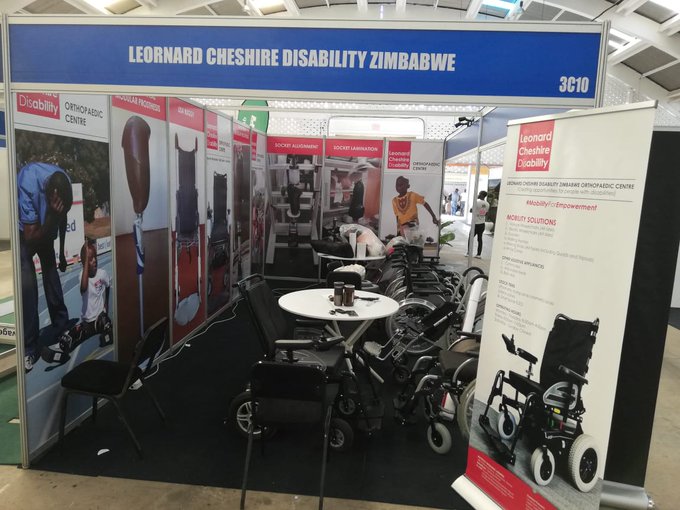By Joyce Mukucha
Leonard Cheshire Disability Zimbabwe (LCDZ) is spearheading Youths Action programme on the Implementation and Monitoring of Disability in Zimbabwe and Zambia to close gaps affecting rights of Youths with Disabilities (YWDs) that remain subdued.
The project which is being funded by the European Union is running for three years that is from January 2019 to December 2021 to ensure a sound, comprehensive and enormous national disability policy in the country.
According to the findings of the baseline survey conducted on the project, the rights of YWDs remain unresponsive primarily on account of lack of sound implementation plans to fulfil the existing policies on disabilities.
In his presentation at the policy dialogue meeting for Portfolio Chairpersons, Government Ministries and YWDs in Harare on the 26th of November 2019, LCDZ Director Greaterman Chivandire said addressing barriers that inhibit the enjoyment of rights by people with disabilities was essential as the country loose Gross Domestic Product percentage by excluding them.
Chivandire pointed out that although there is some good progress on domestication and addressing of issues of disability, YWDs were still being discriminated in their societies particularly women and girls who are not being given the opportunity to show their capability in development processes. In essence, he said, Zimbabwe is expected to abolish laws that discriminate PWDs and ensure that they are protected, respected and promoted.
“People with Disabilities especially youths are a key population which need to be included in all facets of socio-economic development of the nation. The cost of discriminating this key population is a disadvantage to the country. Therefore, there is need for policy formulation and amendments where there are gaps, most policies and legislation in the country still lag behind on implementation of provisions, the United Nations Convention on the Rights of People with Disabilities(UNCRPD) really needs to be put in action,” he said.
Representing Shamva District on YWDs on disability matters, Nyasha Mukova who is also with disability shared with a heavy heart the challenges that are faced with YWDs in their day-to-day lives in different communities. He said stigma remains a stumbling block for YWDs participation in development process community activities as a whole.
“There a number of factors that have a negative impact on us YWDs as we are excluded in decision making processes or competing for political office. In the communities we reside, there is no adequate awareness on YWDs rights. In hospitals, schools, roads, and other places, you find out that the facilities and buildings are not conducive for us so we end up being segregated whenever important programmes are taking place. We plead to the Government to take into consideration our trauma as we suggest that in every sector, there has to be a representative for PWDs so that in every aspect we become included,” said Mukova.
He added that staff in the health, education, justice among other sectors should be capacitated with skills to interact with PWDs when they seek services.
LCDZ Programmes Coordinator Emily Nyoni said the project that will be implemented was aimed at contributing towards the promotion, respect and equal participation of PWDs in Zimbabwe and Zambia. She said it will strengthen partnerships between Disabled Persons’ Organisations (DPOs) and Civil Society Organisations (CSOs) to increase visibility and involvement of YWDs.
“Coordination and cooperation between CSOs and DPOs is important, there are several coordination gaps noted which need to be improved in order to strengthen cooperation and coordination between the important structures contributing to disability. Most of the YWDs are interested in seeing a change in their daily lives that will mainstream them in society, where they will be able to enjoy their rights to education, employment and other key opportunities just like all members of the society,” she said.
It was also observed that not much investment has been made by both governments and to a greater extent, CSOs as well to mainstream YWDs as holders of peculiar rights commensurate with their age and differential abilities.
The Development Aid from People to People (DAPP) Programs Coordinator, Petros Mazuva said pertaining project implementation so far they have managed to launch the programme and inception at national level. They also embarked on capacity building of duty bearers on UNCRPD as well as extending civic education and awareness raising among other activities of rights of YWDs.
“So far, we have managed to carry out a number of activities concerning rights of YWDs but we also found that there is less knowledge on UNCRPD and lack of understanding of YWDs. There is also lack of visibility of YWDs at all levels. In line with this, for now, there is integration of YWDs which is being done to ensure that they are able to speak their voices within their working groups,” he said.
As the project is running, LCDZ is working tirelessly in partnership with Government Ministries to ensure that all infrastructure in the country is disability friendly. It is also pushing hard that sign language becomes a mandatory like all other languages in the bill among other key actions for the betterment of YWDs.






